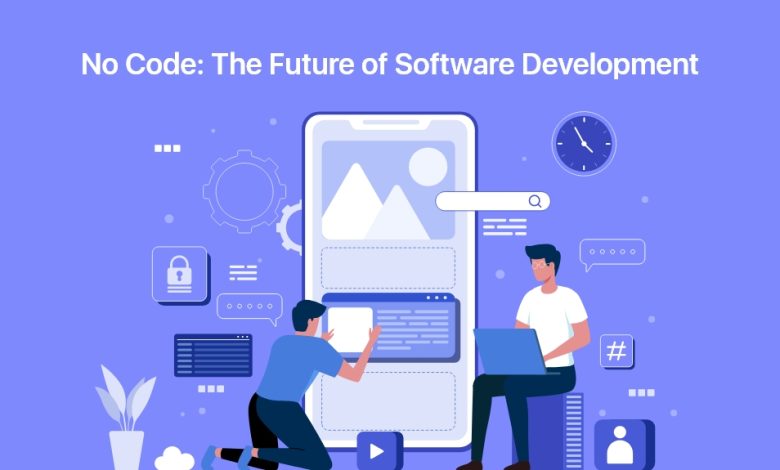Low-code Technology: The Future of Software and Mobile Application Development

In the IT industry, coding is a critical component, essential to building any software or application. No application can exist without coding. But, as the world has seen a massive digital transformation over the past few years, this myth has transformed over time. Yes, you heard it right; it is a myth that without coding, app developers cannot create any software, processes, or mobile apps; today, the no-code/low code technology has taken over the coding functionalities. Now with this software development approach, developers do not need to be pro in coding. It allows them to create robust applications and processes.
So what is Low-code/no-code technology? This article will learn about this innovative software development approach and discuss how app developers in India can use it to build excellent mobile apps and software.
So, let’s get started-
What is Low-code/No code technology?
As the name describes, low-code/no-code is an approach that requires little or no coding to build mobile apps and software. These visual software development approaches help developers to skip complicated coding and make the development process faster than ever before.
This technology has become highly demanded by organizations dealing with app development for their customers, business partners, and employees. According to market reports, The global low-code platform market revenue is valued at almost 13 billion U.S. dollars in 2020 and is forecast to reach approximately 65 billion U.S. dollars in 2027.
This technology comes as a blessing for those who are not software developers but wish to create applications and software. Be it a business analyst, office administrator, or start-up owner; one can quickly build apps and test them in real-time efficiently.
Many businesses still found this technology new, but it is not; it has been around for two decades. In the time of lightning-fast implementation of automation solutions, low code and no-code technology have become game-changers. Today, Technology leaders like Microsoft and Amazon are currently being joined by top Indian firms like Infosys, Tech Mahindra, and HCL as developers of low-code, no-code capability solutions.
The low-code technology bridges the skill gap in the app developers and democratizes the app development process. As a result, the Indian IT industry will see dramatic changes in the next few years.
So moving on, let’s discuss in detail how Indian IT firms adopt low code technology solutions to build engaging applications.
Also Read: Factors to Consider When Choosing Mobile App Development Companies
Indian IT Industry Adopting Low-code Technology Solutions
According to the experts, the COVID-19 has increased the demand for digital applications. Many companies in India are looking to provide customized app solutions to their end-prospects, resulting in growing traction for low-code technology in the Indian IT industry.
As the low-code technology does not require coding to create an application, it allows non-tech professionals to quickly create apps with simple drag and drop features and user-friendly interfaces.
Many enterprises in India aim to build functional software and applications for their clients and internal business processes, but lack of resources and time hinders their business goals and growth. In such times, no-code technology comes as a blessing for them.
In the Indian app development market, low-code technology has seen dramatic demand. And why not? It helps businesses build relevant market applications rapidly and establishes a strong position in the SaaS market. According to the reports, in the next two years, around 75% of large enterprises will adopt low-code development tools that also save their time and dollars to a great extent.
Some prominent organizations in India have already started collaborating with IT firms and app development companies to make their IT operations efficient and within budget. Today in the Indian market, the mindset of building applications and software internally has changed. Now, companies prefer to outsource or purchase the pre-built cloud solutions or platforms that come with user-friendly layouts, customized templates, visual interfaces, and other functionalities that quickly resolve the set of challenges faced by the firms.
This shows that the no-code functionality has become the next big thing in the Indian market.
What benefits Low-code Technology offers to the Indian IT industry?
Low-code technology has a lot more to offer to the Indian IT sector; below, we have mentioned a few immediate benefits that Indian app developers and companies will get after adopting the low-code technology solutions.
#1 Better productivity: Low-code technology automates manual processes, which significantly enhances the developers’ productivity. More apps can be built in less time and delivered to clients. Low-code technology eliminates the deadlines barriers, which ultimately results in higher productivity and better revenues.
#2 Saves time and costs: There is no coding required in low-code technology, so anyone can quickly build apps or software. Companies are not required to hire individual app developers for a specific application project. With features like simple drag and drop and visual interfaces, any non-tech professional can create an app quickly. That ultimately saves the organization’s time and dollars.
#3 Enhanced Customer experience- Low-code technology leads to better customer experience, as it enables organizations to adapt to market changes and understand their customer expectations quickly. Based on the market feedback, they can make quick changes, launch it on time and get the best response.
#4 Less Dependency- Usually, in the app development process, a single change requires a complex set of coding which any person cannot handle. It only needs professional help, but low-code technology eliminates this scenario. No changes can be quickly done by any non-tech professional upon the requirements.
What makes No-code technology demanding in India?
Due to the increasing demand for digital apps, many Indian businesses have started using no-code technology. This helps since their non-executive workforce can create applications with ease and deliver them to clients on time.
According to the industry experts, in the next few years, we will see a massive range of low-code products. But what makes this technology so demanding? Below we have mentioned a few critical features of low-code technology that helps you to understand why this technology has become a primary choice for many mobile app development companies in India.
#1 Security: Security is always a big concern for organizations, and when it comes to no coding, companies become more concerned. The low-code tools come with proper security that prevents applications from malware and threats. That keeps the application highly safe and secure.
#2 Reporting and Monitoring: Low-code technology allows developers to track the complete record of their workflows and processes, increasing the effectiveness. It also lets them analyze the performance of the application, which makes the app perfect at last.
#3 Cross-platform Compatibility: The low-code platform comes with multi-devices compatibility. It can run across all the core platforms and operating systems which makes it demanding in the market.
#4 Reusability: The low-code platform comprises pre-built configured models, plugins, and functionalities that can be reused to develop several solutions quickly.
Final Words:
So these are the essential things that low-code technology brings with it for mobile app developers globally. According to a Gartner forecast, low-code will be responsible for over 65% of application development activity by 2024. This shows how enormous potential this technology bears with it.
If you are an app developer or mobile app development company, it’s time for you to give this technology a try and make robust applications for your end customers in less time. Or, if you have already used this technology, then do let us know your experience with it. We’d be glad to hear from you in our mailbox.
And, If you are looking for programmers that can make out-of-box applications for you, hire app programmers from us and start your project today.




